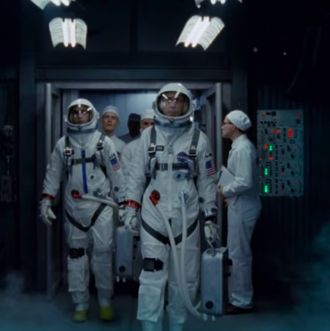
If you’ve seen the harrowing, action-packed trailer for Damien Chazelle’s First Man, you probably won’t be surprised to hear that the Neil Armstrong biopic and ensuing conversation around the film has focused largely on the moon landing as a height of human achievement (i.e. can you believe these crazy astronauts pulled it off?!), rather than the moon landing as a particular moment in American history. But when news circulated that the film doesn’t depict Armstong’s planting of the American flag, some on social media — specifically Senator Marco Rubio — assumed the movie glossed over America’s role in the moon landing entirely. Tweeted Rubio on Friday, “This is total lunacy. And a disservice at a time when our people need reminders of what we can achieve when we work together. The American people paid for that mission, on rockets built by Americans, with American technology & carrying American astronauts. It wasn’t a UN mission.”
The concern was compounded by lead Ryan Gosling’s comment at the Venice Film Festival that, “I don’t think Neil viewed himself as an American hero, quite the opposite.” Since the film doesn’t come out until October 12, and the rest of us cannot verify to what degree Chazelle’s depiction of the first moon landing is appropriately American or not, Armstrong’s sons Rick and Mark, along with First Man author James R. Hanson, published an open letter on Friday confirming both that the film is not “anti-American” and that the American flag gets so much screen time, it’ll be eligible for a Best Supporting Flag nomination, though that screen time does not include the planting itself.
“Although Neil didn’t see himself that way, he was an American hero. He was also an engineer and a pilot, a father and a friend, a man who suffered privately through great tragedies with incredible grace,” their statement reads. “This is why, though there are numerous shots of the American flag on the moon, the filmmakers chose to focus on Neil looking back at the earth, his walk to Little West Crater, his unique, personal experience of completing this journey, a journey that has seen so many incredible highs and devastating lows.” You can read the full letter below.
We’ve read a number of comments about the film today and specifically about the absence of the flag planting scene, made largely by people who haven’t seen the movie. As we’ve seen it multiple times, we thought maybe we should weigh in.
This is a film that focuses on what you don’t know about Neil Armstrong. It’s a film that focuses on things you didn’t see or may not remember about Neil’s journey to the moon. The filmmakers spent years doing extensive research to get at the man behind the myth, to get at the story behind the story. It’s a movie that gives you unique insight into the Armstrong family and fallen American Heroes like Elliot See and Ed White. It’s a very personal movie about our dad’s journey, seen through his eyes.
This story is human and it is universal. Of course, it celebrates an America achievement. It also celebrates an achievement “for all mankind,” as it says on the plaque Neil and Buzz left on the moon. It is a story about an ordinary man who makes profound sacrifices and suffers through intense loss in order to achieve the impossible.
Although Neil didn’t see himself that way, he was an American hero. He was also an engineer and a pilot, a father and a friend, a man who suffered privately through great tragedies with incredible grace. This is why, though there are numerous shots of the American flag on the moon, the filmmakers chose to focus on Neil looking back at the earth, his walk to Little West Crater, his unique, personal experience of completing this journey, a journey that has seen so many incredible highs and devastating lows.
In short, we do not feel this movie is anti-American in the slightest. Quite the opposite. But don‚Äôt take our word for it. We‚Äôd encourage everyone to go see this remarkable film and see for themselves.¬Ý¬Ý

